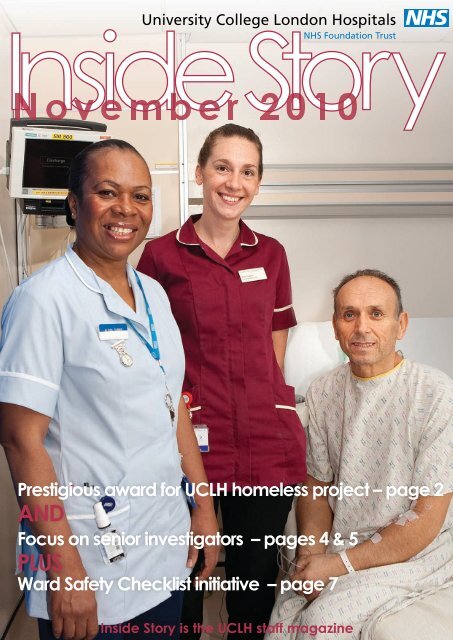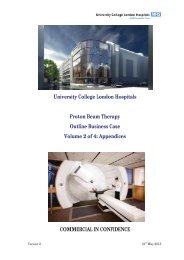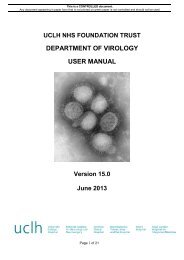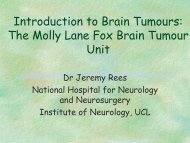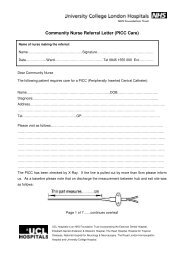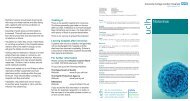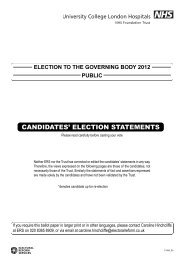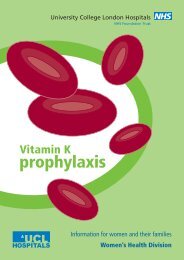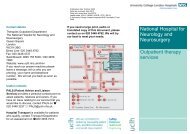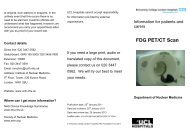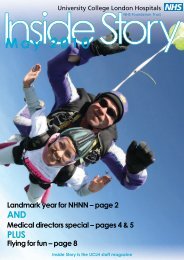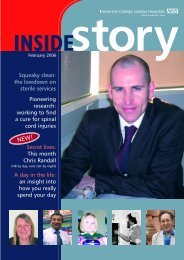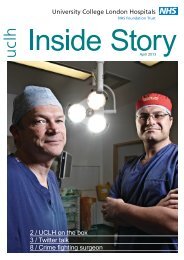Inside Story - University College London Hospitals
Inside Story - University College London Hospitals
Inside Story - University College London Hospitals
Create successful ePaper yourself
Turn your PDF publications into a flip-book with our unique Google optimized e-Paper software.
<strong>Inside</strong> <strong>Story</strong><br />
Prestigious award for UCLH homeless project – page 2<br />
AND<br />
Focus on senior investigators – pages 4 & 5<br />
PLUS<br />
Ward Safety Checklist initiative – page 7<br />
<strong>Inside</strong> <strong>Story</strong> is the UCLH staff magazine
news<br />
UCLH homeless project scoops top award<br />
A pioneering project which is changing<br />
the lives of hundreds of homeless<br />
people has scooped a prestigious<br />
award.<br />
The <strong>London</strong> Pathway project, based at<br />
UCH, is giving homeless people access<br />
to proper healthcare and saving the<br />
NHS money in the process.<br />
The project won the Andy Ludlow<br />
homelessness award which promotes<br />
innovation and good practice in tackling<br />
homelessness in the capital.<br />
The <strong>London</strong> Pathway uses a dedicated<br />
homelessness nurse and GP to make<br />
sure that homeless patients get all the<br />
care they need – including support after<br />
they have left the safety of the hospital.<br />
It has reduced admissions of homeless<br />
people to UCH by 3.2 days per patient,<br />
which equates to savings of £300,000<br />
a year.<br />
The project beat five other short-listed<br />
groups to win the top prize of £25,000.<br />
Dr Nigel Hewett, clinical lead of the<br />
homeless team at UCH and medical<br />
director of The <strong>London</strong> Pathway, said:<br />
“This award publicly rewards the<br />
incredible dedication of my two <strong>London</strong><br />
Pathway nurses – Flo Cumberbatch<br />
and Trudy Boyce – and all the fantastic<br />
staff at UCLH who we work with, and<br />
who are trying to turnaround the lives<br />
of homeless people.”<br />
Alex Bax, chief executive of the<br />
<strong>London</strong> Pathway a project set up with<br />
funding provided by UCLH Charity,<br />
said: “Winning this award is fantastic”.<br />
Putting bright QEP ideas into action<br />
The QEP Improvement Network<br />
launched recently will provide practical<br />
support to staff eager to introduce QEP<br />
projects in their working areas.<br />
Staff will receive training in project<br />
management and change management<br />
skills, as well as one-to-one support<br />
and mentoring from an experienced<br />
‘improvement coach’.<br />
Guy Young, head of quality<br />
improvement, who is one of the<br />
mentors, said: "Frontline NHS staff are<br />
never short of good ideas. Sadly, these<br />
ideas don't often reach fruition and this<br />
is where the improvement network will<br />
make a big difference.<br />
"The enthusiasm shown by the people I<br />
am coaching is striking and their<br />
projects are innovative and exciting. My<br />
job is to help them to make their ideas<br />
reality and I am very much looking<br />
forward to it."<br />
Training sessions start in late<br />
November. Master classes and monthly<br />
improvement clinics will be held in early<br />
2011. If you wish to join the 2011<br />
Improvement Network please contact<br />
Laura Alexander on ext 3269.<br />
Staff survey: have you<br />
completed yours?<br />
Have you received a 2010<br />
staff survey pack? If so,<br />
make sure you fill it in and<br />
return it by 10 December.<br />
This is an opportunity for<br />
those people randomly<br />
selected to have their say<br />
about UCLH and also have<br />
the chance to win a £100<br />
John Lewis voucher.<br />
Blueprint for success<br />
Printers, photocopiers, scanners and fax<br />
machines across the Trust were upgraded<br />
and brought under the management of a<br />
single supplier in June this year. Previously,<br />
different departments bought these items<br />
from different suppliers which resulted in<br />
varying quality across the Trust and high<br />
cost for purchase and maintenance. We<br />
have now ‘bought in bulk’ and work with one<br />
supplier for purchase and maintenance of<br />
these items across our six hospitals, saving<br />
money and equipping our staff with access<br />
to modern technology on a day-to-day basis.<br />
James Thomas, director of ICT said: “The<br />
contract with Logica will generate a saving of<br />
£123,000 per year, which is £0.86 million<br />
over the proposed seven years of the<br />
contract. But this has not just been about<br />
saving money. Staff across the Trust,<br />
including those in clinical areas, now also<br />
have access to high tech print management<br />
tools including colour printing, double sided<br />
printing, scanning and emailing direct from<br />
their PCs.”<br />
Contact Us<br />
If you have any information you would like included in <strong>Inside</strong> <strong>Story</strong>, or on the Trust intranet site<br />
Insight, contact: Communications Unit, 2nd Floor Central, 250 Euston Road, <strong>London</strong> NW1 2PG.<br />
Email: communications@uclh.nhs.uk, Tel: ext 9897, Fax: ext 9401.<br />
Front cover: Althia Turner,<br />
nurse, and Ellie Knights,<br />
divisional senior nurse, with a<br />
patient. See page 2.<br />
2
news<br />
Don’t stop believing<br />
Althia Turner is proof that it’s never<br />
too late to pursue your dreams.<br />
After 26 years as a domestic<br />
supervisor, physiotherapy and health<br />
care assistant at UCLH, she decided<br />
the time was right to start a new<br />
chapter in her life.<br />
Althia (pictured above) embarked on a<br />
full-time university course and has<br />
recently qualified as a nurse – at the<br />
age of 55.<br />
Althia said: “When I was doing the<br />
other jobs I knew I wanted more… but<br />
I was caring for three grandchildren<br />
and it just wasn’t possible. When my<br />
50th birthday approached I decided I<br />
wanted a change in my life and to do<br />
something for myself. I feel so proud<br />
at what I have achieved. My husband<br />
and children are proud of me too!”<br />
She was encouraged to move up the<br />
career ladder after chief nurse and<br />
talent spotter Louise Boden made a<br />
comment.<br />
“One day I was sent to first aid<br />
training where I met a colleague called<br />
Louise Boden who was a chief nurse.<br />
Louise assumed that I was a nurse.<br />
When Louise saw my badge one day<br />
she was surprised and said ‘why don’t<br />
you go for it?’ She inspired me.”<br />
As a first step, she beat off stiff<br />
competition to win a healthcare<br />
assistant post at The Heart Hospital<br />
and subsequently gained her NVQ.<br />
Then – with support from senior<br />
colleague Ellie Knights – she signed<br />
up for three years at South Bank<br />
<strong>University</strong>. Her<br />
studies were<br />
funded by<br />
UCLH.<br />
When the<br />
going got<br />
tough she<br />
knew she<br />
could rely on<br />
her friends<br />
and<br />
colleagues.<br />
“I didn’t have a secondary education<br />
so I found university difficult at first.<br />
When I was upset Louise and other<br />
colleagues were very kind and<br />
considerate and offered me support.<br />
Louise in particular has shown an<br />
interest throughout it all.”<br />
Louise said Althia is a great example<br />
of how it is never too late to develop<br />
your career.<br />
Louise added: “It is helping colleagues<br />
like Althia that makes my job really<br />
worthwhile. I wish her continued<br />
success – and I have no doubt that<br />
she will make a great nurse.”<br />
Althia returns to The Heart Hospital as<br />
a fully qualified staff nurse this<br />
autumn.<br />
“It’s made me realise you can achieve<br />
anything if you put your mind to it. I<br />
feel on top of the world,” she added.<br />
Louise Boden will step down from her role as chief nurse<br />
when she retires at the end of the month after 41 years in the<br />
NHS. Louise who has spent nearly 18 years at UCLH will be<br />
replaced by Katherine Fenton, chief nurse and director of<br />
clinical standards at NHS South Central, who takes up her<br />
role in January. Louise said: "It has been a real privelege to<br />
have worked for so long in such a rewarding profession. I<br />
have been fortunate to work with some wonderful people in<br />
fascinating organisations and I will always look back fondly at<br />
my time at UCLH which has been the pinnacle of my career."<br />
Health secretary visits UCH cancer centre<br />
The charity Macmillan Cancer<br />
Support has announced its biggest<br />
ever investment to help build what will<br />
be the UK’s most advanced cancer<br />
centre at UCLH.<br />
The announcement was marked at a<br />
reception attended by health<br />
secretary Andrew Lansley, who visited<br />
the site of the UCH Macmillan Cancer<br />
Centre.<br />
Macmillan has agreed to contribute<br />
£10 million to the centre which will<br />
open in 2012 and cost £100 million to<br />
build.<br />
Mr Lansley met staff, patients and<br />
Macmillan representatives at the UCH<br />
Education Centre, before visiting the<br />
construction site at nearby Huntley<br />
Street.<br />
He said: “You are a fantastic hospital<br />
that delivers a fantastic service to the<br />
people you look after. To develop that<br />
service even more is absolutely<br />
critical. Thanks to Macmillan for all<br />
they are doing to enable this to<br />
happen.”<br />
The UCH<br />
Macmillan Cancer<br />
Centre will be the<br />
first of its kind in<br />
the NHS and will<br />
redefine the way<br />
patients are<br />
treated, using the<br />
best diagnostic<br />
and treatment<br />
techniques to<br />
improve survival<br />
rates. Every detail<br />
of the centre has<br />
been designed<br />
around the needs<br />
of individual patients with more focus<br />
on the best treatments, wellbeing,<br />
rehabilitation and cancer survivorship.<br />
It is due to open in 2012.<br />
From l to r: Richard Murley, UCLH chairman, Steve Richards, Macmillan<br />
director, Julia Palca, Macmillan chair, Andrew Lansley, Secretary of<br />
State for Health and Sir Robert Naylor, UCLH chief executive<br />
3
focus on research<br />
4<br />
Spotlight on top researchers<br />
Twenty-two consultants and professors from UCLH and<br />
UCL are among a select group making the most<br />
outstanding contribution to patient-focused health<br />
research in the NHS.<br />
They hold the prestigious post of senior investigator for the<br />
National Institute for Health Research (NIHR), the<br />
research arm of the Department of Health.<br />
They are also linked to the UCLH/UCL Comprehensive<br />
Biomedical Research Centre (CBRC), one of only five in<br />
the country, which brings together the work of hundreds of<br />
scientists, doctors, nurses and allied health professionals<br />
looking into some of the major causes of illness and<br />
disease-related death.<br />
Senior investigator Professor Deenan Pillay has recently<br />
been appointed CBRC director and described it as ‘linking<br />
world class clinical care at UCLH with equally world class<br />
research at UCL’.<br />
He added: “The purpose of the CBRC is to provide a<br />
structure for funnelling resource to support clinicians and<br />
clinical support staff in research activity.<br />
“This ensures that UCLH remains at the very forefront of<br />
developing novel clinical services at the cutting edge of<br />
healthcare, which in turn attracts the highest quality staff.”<br />
The key area for CBRC development over the coming<br />
months is experimental medicine – in line with the priority<br />
of the NIHR, which funds the UK’s five CBRCs.<br />
Deenan explained: “Experimental medicine represents the<br />
pre-clinical, scientific endeavours and early clinical trials of<br />
new interventions into diseases. For example, new drugs,<br />
new vaccines and new diagnostics.<br />
“My aim is for CBRC-based research to allow UCLH to<br />
offer the newest and most effective treatments for complex<br />
diseases, including cancer and neurological conditions<br />
and cardiovascular disease.”<br />
This month we focus on the work of Deenan and<br />
fellow senior investigator Professor David Linch.<br />
From l to r: Professor Martin Rosser, UCLH/UCL; Professor Deenan<br />
Pillay, UCLH/UCL; Professor John Duncan, UCLH/UCL; Professor<br />
Anne Johnson, Camden PCT/UCL; Dame Professor Sally Davis,<br />
director of NIHR and interim chief medical officer. Picture taken at a<br />
recent NIHR conference<br />
Bringing hope to HIV patients<br />
Clinical virologist Deenan Pillay and his team have made a<br />
huge difference to the lives of people with HIV, flu and viral<br />
hepatitis.<br />
When the swine flu pandemic spread across the world last<br />
year, it was the clinical virology department at UCLH which<br />
played a fundamental role in the rapid development of tests<br />
to detect the virus and identify drug-resistant strains.<br />
For many years, Deenan’s main research interest has been<br />
the use of anti-viral drugs to combat HIV. The once killer<br />
disease can now be treated with a range of drugs which<br />
can significantly prolong the lives of those infected.<br />
However these dramatic advances have come at a cost: the<br />
virus has evolved to become resistant to certain drugs.<br />
Deenan uses complex methods of gene sequencing to<br />
detect how this happens to make sure patients get the most<br />
appropriate treatment.<br />
In collaboration with the Medical Research Council, Deenan<br />
(pictured above) and his team have built up a picture across<br />
the UK of how drug resistant strains of the HIV virus are<br />
being transmitted. He has now extended this to a<br />
European-wide network, through major EU funding.<br />
He said: “From the work we have done, the national<br />
guidelines have changed for monitoring HIV infection in<br />
order for the correct treatment to be given right from the<br />
beginning and tailored to the patient.<br />
“HIV drugs cost between £10,000 and £15,000 a year for<br />
each patient and it means that the patient outcome is<br />
improved and money is not wasted on giving ineffective,<br />
expensive treatments.”
focus on research<br />
Stem cell breakthroughs for cancer patients<br />
CBRC key facts<br />
18 research themes<br />
Over £5m invested in<br />
new translational<br />
research projects<br />
Over £25m invested in<br />
staff, equipment and<br />
research facilities,<br />
including the Clinical<br />
Research Facility<br />
136 consultants funded<br />
Professor David Linch is at the forefront of<br />
clinical research which has the potential to<br />
save the lives of thousands of patients<br />
with blood cell cancers. Throughout the<br />
decades, his dogged determination to<br />
push back the boundaries of scientific<br />
investigation and uncover new patient<br />
treatments and therapies remains<br />
undiminished.<br />
“There are constantly new goals – goals<br />
that evolve on a daily basis. The second<br />
you achieve one goal, three more goals<br />
appear. It a step-by-step process and you<br />
never reach the end of the journey.<br />
“I wake up each morning and look forward<br />
to coming to work. As long as I do, I will<br />
continue.”<br />
When the 59-year-old consultant<br />
haematologist first embarked on that<br />
journey in the early 1980s, the prognosis<br />
was poor for the vast majority of patients<br />
with leukaemia. Only 5% survived<br />
compared to 40-50% of younger adults<br />
today.<br />
For patients failing standard therapy, high<br />
dose therapy with autologous (patients’<br />
own) stem cell transplantation can rescue<br />
nearly half the patients with lymphoma.<br />
The Department of Haematology at UCLH<br />
was at the forefront of these<br />
developments and is now leading the field<br />
in defining the role of allogeneic (donor<br />
cell) transplantation.<br />
Professor Linch (pictured right) is<br />
currently leading a study to test tissue<br />
samples from patients at UCLH and<br />
elsewhere to determine the genetic<br />
changes which give rise to acute myeloid<br />
leukaemia. Understanding those changes<br />
will help in the development of new<br />
therapies and treatments.<br />
“The greatest advantage of working at<br />
UCLH is the long standing tradition of a<br />
shared agenda between the hospital and<br />
the university. It enables you to do things<br />
that would just not be possible in many<br />
other institutions. In haematology we<br />
make very little distinction between who is<br />
hospital and who is university – everyone<br />
provides a clinical service and everyone<br />
makes a contribution to research and<br />
teaching, he added.“<br />
Research support for nurses and midwives<br />
A new centre launched at UCLH aims to<br />
encourage and support nurses and<br />
midwives to become more involved in<br />
research projects to benefit patients.<br />
The Centre for Nurse and Midwife-Led<br />
Research (CNMR) will provide expert<br />
guidance to help them develop research<br />
ideas into practice.<br />
It is based within the UCLH/UCL<br />
Comprehensive Biomedical Research<br />
Centre at Maple House.<br />
Project lead Kay Mitchell, a UCH nurse<br />
and researcher at UCL’s Portex Unit,<br />
said: “Sometimes even a small research<br />
project can make a big difference to<br />
patient care. Nurses and midwives –<br />
whether at junior or senior level – are<br />
well placed to see what patients need<br />
and what could be improved.<br />
“The centre will provide them with<br />
resources and a network of support from<br />
senior academic and clinical<br />
colleagues.”<br />
Intensive care nurse Alison Paterson<br />
(nee Mulligan) has recently published<br />
her research study findings into<br />
validating the effectiveness of current<br />
early warning systems (track and trigger)<br />
for identifying haematology patients who<br />
are developing critical illness.<br />
She said: “The CNMR would have really<br />
helped me throughout the process by<br />
enabling me to tap into existing research<br />
expertise. Advice on data collection and<br />
analysis and writing the research<br />
proposal would have been invaluable!”<br />
If you are already involved in research or<br />
would like to be please contact Kay on<br />
kay.mitchell@uclh.nhs.uk<br />
Sheila Adam, head of nursing for the<br />
surgery and cancer board and nursing<br />
lead for education and research said: "It<br />
is one of the most important steps<br />
forward taken by UCLH and the CBRC<br />
in building research capacity amongst<br />
our nurses and midwives."<br />
5
interview<br />
Blood, sweat and tears<br />
Darielle Proctor reports<br />
Jenny Berryman runs a tight ship.<br />
Her team has to be meticulously<br />
precise – there is no room for error or<br />
lives are on the line.<br />
Jenny (pictured right) is the Trust’s<br />
Blood Transfusion Laboratory<br />
manager and she runs the Blood<br />
Transfusion lab based in Whitfield<br />
Street.<br />
The Blood Transfusion Laboratory<br />
runs 24 hours a day, 365 days a year<br />
and provides the hospitals across the<br />
Trust with approximately 70,000<br />
blood products – such as blood,<br />
platelets and plasma – every year.<br />
“This is an around the clock job,”<br />
says Jenny.<br />
“The laboratory team consists of a<br />
core of dedicated biomedical<br />
scientists (BMSs), a quality manager<br />
and a training officer. We work as<br />
part of the Hospital Transfusion Team<br />
alongside consultants and<br />
transfusion practitioners to ensure<br />
that we deliver blood, and blood<br />
products, to the patients who need<br />
them as quickly as possible.”<br />
The blood labs are stark and spartan –<br />
clinically spotless and fastidiously<br />
clean. In the background the fridges<br />
hum reassuringly and agitators rock<br />
rhythmically so that packs of platelets<br />
are kept alive (they only have a five<br />
day shelf life and this is even shorter if<br />
the platelets aren’t kept moving).<br />
The laboratory works efficiently with<br />
biomedical scientists busily analysing<br />
samples to check blood groups and<br />
Some members of the Blood Transfusion Laboratory team<br />
the presence of red cell antibodies.<br />
They also have to check to see if<br />
antibodies are present –<br />
approximately 10% of the blood issued<br />
at UCLH is for patients with antibodies<br />
in their blood. Depending on which<br />
antibody is present, it can often take<br />
up to an hour to crossmatch and<br />
ensure compatibility. Compatible blood<br />
may have to be specially ordered and<br />
for very rare types it can take several<br />
days to obtain.<br />
The safety checks – both manual and<br />
electronic, including scanners,<br />
signatures, labels, registers and legal<br />
tags – are rigorous to ensure that the<br />
right patient receives the right blood<br />
and blood products.<br />
Given that the team can issue up to<br />
200 products a day it is easy to see<br />
why there is a need for a fail-safe<br />
system.<br />
Blood transfusion and haematology<br />
together recently attained Clinical<br />
Pathology Accreditation which<br />
assures users of high standards.<br />
In 2005 a new law was introduced to<br />
ensure standards of quality in blood<br />
transfusion in the UK and particularly<br />
that all donor blood could be traced<br />
from donor to recipient via the donor<br />
number. Jenny explains that a lot of<br />
“hard work over the past five years”<br />
has been focussed on blood<br />
traceability. Each pack of blood that<br />
is delivered to a patient has a<br />
detachable ‘pinkie’ – a piece of<br />
paper that has to be filled in by the<br />
doctor or nurse administering the<br />
donor blood – and it has to be<br />
returned to the Blood Transfusion Lab.<br />
It is this piece of paper that enables<br />
the blood team to see if the patient<br />
received the donor blood that was<br />
allocated to them.<br />
“Until we receive the pinkie we cannot<br />
assume that the patient has received<br />
the blood” says Jenny.<br />
“We need to be able to decisively<br />
report if the patient actually receives it,<br />
if not then we need to make sure the<br />
blood is returned to us and either reissued<br />
for another patient or destroyed<br />
if it has been out of a fridge for too<br />
long or is past its expiry date.”<br />
Jenny adds: “Our best compliance<br />
score has been 99% but we normally<br />
average between 98 and 99%. Whilst<br />
this sounds high we do need to be<br />
hitting 100%. Our patients’ health<br />
and well-being is at risk when we<br />
cannot track where blood has ended<br />
up after it leaves our fridges or don’t<br />
know for how long it has been<br />
removed.”<br />
Jenny credits the success to hard<br />
working team members who pull<br />
together to ensure that there is<br />
nothing blocking a system that runs<br />
smoothly, quickly and efficiently.<br />
6
Staff make a clean sweep of infection control awards<br />
If Sally Calimoso suddenly drops to her<br />
knees in the middle of T9 don’t be<br />
unduly alarmed. She’s just doing her<br />
job.<br />
“I randomly check the floor is clean<br />
under the beds. If it’s not – it soon will<br />
be!” said Sally who won the Trust’s<br />
Housekeeper of the Year infection<br />
control award.<br />
She was one of several staff praised<br />
for helping to keep our hospitals clean<br />
and free from infection.<br />
The awards were presented at a Trust<br />
infection control study day for clinical<br />
staff at 33 Queen Square which<br />
Other award winners picked by the infection control<br />
team were Dr Chris Taylor from the NHNN; T6 nurse<br />
Angie Brooker and domestic staff Maria Goncalves<br />
and Zlatina Georgieva.<br />
Annette Jeanes, director for infection prevention and<br />
control said: "We wanted to publicly recognise the<br />
great work people do every day – those who get it<br />
right and strive to keep it that way."<br />
A simple checklist which encourages<br />
staff to pause and consider safety<br />
issues is being introduced on all<br />
inpatient ward rounds across the Trust.<br />
The Ward Safety Checklist (WSC) is<br />
partly based on a similar initiative<br />
sponsored by the World Health<br />
Organization (WHO): the Surgical<br />
Safety Checklist reduced safety-related<br />
incidents in operating theatres across<br />
the Trust, as well as improving team<br />
communication.<br />
Dr Yogi Amin, programme lead for<br />
WSC, said: “We watched and<br />
supported the WHO programme very<br />
closely and started to wonder how<br />
the approach could have a wider<br />
impact – ward rounds were the<br />
obvious answer.”<br />
Yogi, a consultant neuro anaesthetist<br />
and intensivist at the NHNN, said the<br />
idea is not to dictate how people<br />
actually conduct rounds, but to offer a<br />
straightforward checklist for issues<br />
like VTE prophylaxis, skin care and<br />
fluid balance, things that can cause<br />
harm if they are overlooked.<br />
The project team reviewed existing<br />
draft checklists from UCLH and<br />
included practical sessions, workshops<br />
and presentations on a number of<br />
issues including updated antibiotic<br />
guidelines, hand hygiene and the<br />
enhanced recovery programme. It<br />
aimed to influence practice in<br />
accordance with the ‘Saving Lives –<br />
High Impact Interventions’ programme.<br />
Sally (pictured right) spends her days<br />
doing various tasks but takes particular<br />
notice of those related to infection<br />
control: spot cleaning spillages,<br />
removing clutter, cleaning drip stands<br />
and commodes, monitoring cleaning<br />
standards and double checking that<br />
there is no dust or grime<br />
lurking in awkward<br />
nooks and crannies.<br />
She said: “I know the<br />
Trust goal is to deliver<br />
high quality care and<br />
infection control is a<br />
major part of that. My<br />
contribution helps and I<br />
feel great satisfaction<br />
to know I am making a<br />
Ward safety – let’s pause for thought …<br />
elsewhere and observed a series of<br />
real ward rounds to help refine the final<br />
design.<br />
During a recent training day at the UCH<br />
Education Centre, staff were able to<br />
practise using the checklist in simulated<br />
ward exercises, and decide precisely<br />
how they were going to integrate the<br />
checklist into their own practice. Some<br />
attendees were able to explain how the<br />
checklist might have avoided recent<br />
serious untoward incidents.<br />
our trust<br />
difference to patients and staff. I’m<br />
much tougher than I used to be. If I<br />
see a colleague who hasn’t washed<br />
their hands properly I’ll remind them!<br />
“I just like the ward to be safe and tidy.<br />
I’m like that at home too!”<br />
The Education Centre training<br />
programme will run until March 2011<br />
and around 1,300 Trust staff will go<br />
through the course; a number of senior<br />
nurses, clinical and medical directors<br />
have already attended, with others<br />
already booked on.<br />
For information about the WSC<br />
programme and details of programme<br />
dates please contact Carina Goncalves<br />
on 0207 380 9613, or email<br />
WSC@uclh.nhs.uk<br />
Staff learn more about the Ward Safety Checklist at a training programme at the Education Centre<br />
7
the back page<br />
Secret lives<br />
Q: What has lobster-wearing, steak<br />
bearing showgirl Lady Gaga got in<br />
common with cancer services PA Olivia<br />
Mulholland? A: When it comes to<br />
flamboyant hats they are both head<br />
and shoulders above the rest.<br />
A striking Las Vegas roulette wheel<br />
spinning in fibre optic lights and<br />
encrusted with crystals; an oversized<br />
figure of ‘5’ in black velvet curled<br />
around the eye; glitter and leather<br />
poker cards festooned with feathers –<br />
Olivia’s millinery creations are rarely<br />
dull. Others are more subtle in design<br />
with lace, pearls and velvet fitting for a<br />
bride’s big day or an outing at Ascot.<br />
Before joining UCLH, Olivia completed<br />
a two-year millinery course at<br />
Kensington and Chelsea <strong>College</strong><br />
before successfully undertaking a<br />
degree in accessories at <strong>London</strong><br />
<strong>College</strong> of Fashion.<br />
“I love big hats, flamboyant and<br />
dramatic from a glamorous era. They<br />
definitely make an outfit look more<br />
special and I have designed tiaras and<br />
hats for lots of weddings and special<br />
occasions. My more outrageous Las<br />
Vegas themed ones were designed as<br />
part of my college course and<br />
they are still on display at home.<br />
“I used to want to open a shop in<br />
the country, designing and selling<br />
hats with a black Labrador at my<br />
feet but somehow I find myself<br />
here, at UCLH.”<br />
Life in the cancer services division<br />
maybe an unlikely choice for a<br />
milliner like Olivia, but it suits her<br />
well.<br />
Olivia, who started off as a temp,<br />
now works as PA to general<br />
managers Emily Fremantle,<br />
Chrissie Baylis and Jessica<br />
Tudor-Williams.<br />
She said: “I never thought I would<br />
enjoy working in an office but I really<br />
like it here. My colleagues are great.<br />
Now I am happy to make hats on the<br />
side.”<br />
Art therapy<br />
The Children and Young People<br />
Outpatients Department is running<br />
more clinics than ever before and<br />
now sees an average of 500<br />
patients per week. To help<br />
reassure patients and to keep<br />
them occupied whilst they are<br />
waiting, the department has<br />
introduced art workshops funded<br />
by the Friends of UCLH and run by<br />
artist Frances Newman.<br />
The therapeutic nature of the<br />
workshops enables young people<br />
to express their feelings and<br />
emotions about their condition and<br />
ongoing treatment through their<br />
artwork. Liz Wilkinson, the<br />
clinic’s play specialist, said:<br />
“Participating in art projects<br />
can help to distract from pain<br />
and discomfort by providing<br />
an alternative focus. Often the<br />
patients produce a piece of<br />
artwork which they can take<br />
home with them giving them a<br />
sense of having achieved<br />
something.”<br />
Competition<br />
Win a set of four tickets<br />
for the Christmas<br />
Spectacular at the O2 arena. The O2<br />
arena has kindly donated 4 tickets to see<br />
the Raymond Gubbay, the classical<br />
spectacular impresario.<br />
The event on 23 December at 7.30pm<br />
will be a rousing night of carols,<br />
traditional tunes and some cracking<br />
Christmas number one hits.<br />
For your chance to win these tickets send<br />
your answer to the question below by<br />
email to: competition@uclh.nhs.uk.<br />
Q: How many research themes does<br />
the CBRC have?<br />
Competition entries must be received by<br />
17 December, winners will be notified by<br />
20 December.<br />
Archives<br />
The Photographic Department<br />
at the Eastman Dental Hospital<br />
in the 1950s was equipped with<br />
a full dental unit for<br />
instructional film making. In this<br />
image Mr James Morgan is<br />
operating the camera.<br />
Open Event<br />
Christmas is fast approaching! Join us at the<br />
UCLH open event on Tuesday 7 December<br />
between 3.30pm and 6pm for a mince pie<br />
and some festive cheer. West End star Lee<br />
Mead will be turning on the Christmas tree<br />
lights. Don’t forget to tell your colleagues,<br />
patients, friends and family.<br />
8


